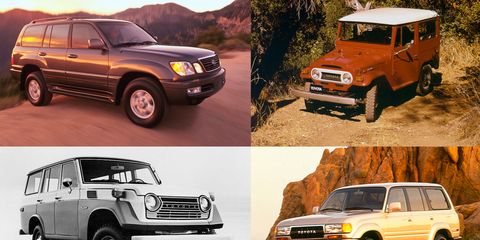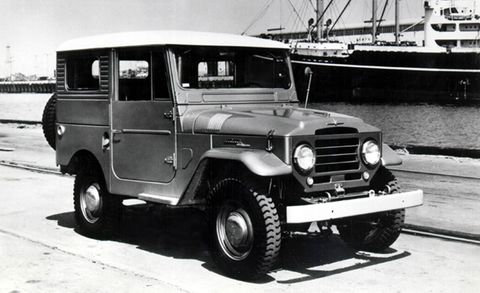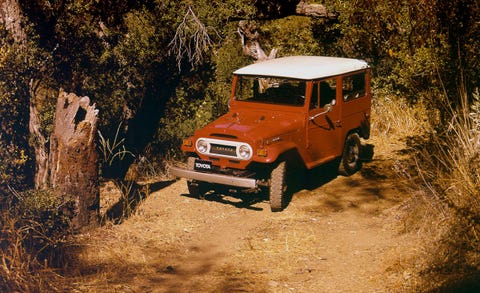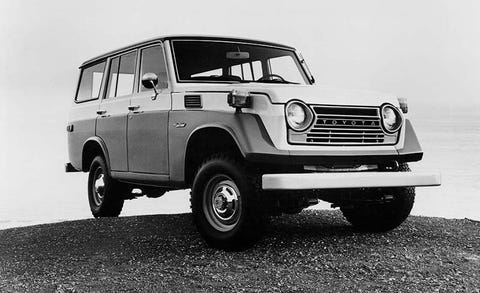How to Tell if Miles Rolled Back on Land Cruiser

The Manufacturer Car and Driver
Credit the Korean War for the birth of the Toyota Land Cruiser. Following North Korea's invasion of South Korea in June 1950, the United States of America sought to support pro-Western South Korea against its Soviet-backed aggressors. Military trucks were needed, and the U.S., which then still occupied Japan, urged the island nation to develop a domestically produced vehicle for this need. The idea was thus: The U.S. could use such a locally sourced truck in conflicts throughout the region.
By the beginning of 1951, Toyota had developed a military-truck prototype. The Toyota Jeep BJ, as it was initially known, was motivated by the company's B-type 3.4-liter inline-six engine and featured styling that was inspired by the off-road-friendly, military-spec Jeeps driven by U.S. forces stationed in Japan. Although the Japanese brand's military truck would be passed over by the country's National Police Reserve Forces for the Willys Jeep, the Toyota made enough of an impression that it soon was commissioned for use as a patrol car for Japan's National Police Agency.
The Toyota Jeep BJ soon found itself in the crosshairs of Willys' legal team, though, as the American automaker claimed ownership of the "Jeep" name and believed that Toyota was infringing on its trademark. In response, Toyota renamed the vehicle Land Cruiser and began selling it as such in the middle of 1954. It wouldn't be until 1958, however, that U.S. consumers would have the opportunity to get their hands on one. Click through to learn more about the history of Toyota's iconic SUV in America.

The Manufacturer Car and Driver
1 of 15
Toyota Land Cruiser 20-series
Toyota Motor Sales, U.S.A., Inc., is formed on October 31, 1957, with American sales of the company's motor vehicles beginning in 1958. The brand sells a total of 288 vehicles in its inaugural year in the U.S. market: 287 Toyopet Crown sedans and a single Land Cruiser, internally regarded as the 20-series. Power for the Jeep-like SUV comes from Toyota's F-type inline-six engine, which displaces 3.9 liters.

The Manufacturer Car and Driver
2 of 15
Toyota Land Cruiser 40-series
Despite limited initial demand, the Land Cruiser quickly makes a name for itself, and the model becomes the best-selling Toyota in the United States from 1961 to 1965. The famed 40-series Land Cruiser is introduced in 1960; the model also goes by the name FJ40 (F for the engine type, J for Jeep), and subsequent generations follow this naming convention. According to Dan Busey of the Land Cruiser Heritage Museum, the 40-series Land Cruiser is initially sold concurrently with the 20-series. Although the 40-series' looks are evolutionary, it is a revolutionary product.
New assembly techniques improve the finished product, and the addition of a two-speed transfer case betters the four-wheel-drive SUV's off-road capabilities. A larger 2F-type 4.2-liter inline-six is added to the model in 1975, and that engine powers the 40-series Land Cruiser until Toyota stops selling the model stateside after the 1983 model year. Decades later, the FJ Company loans us a thoroughly restored and modernized 1981 FJ43 Land Cruiser that includes top-notch build quality and sports a $200,000 price of entry.

The Manufacturer Car and Driver
3 of 15
Toyota Land Cruiser 55-series
Toyota introduces the 55-series Land Cruiser wagon in 1967 as a more comfortable, passenger-friendly alternative to the rugged 40-series. Resting on a 16-inch-longer wheelbase, the 55-series Land Cruiser boasts a number of model-specific changes compared with the smallest 40-series SUV. Its 3.9-liter inline-six features a new head shape and a camshaft modeled after the company's smaller 2R-type four-cylinder engine, the combination of which improves the big SUV's ability to cruise at highway speeds.
As does the 40-series Land Cruiser, the 55-series trades the old F-type engine for the new 2F-type 4.2-liter inline-six in 1975. Alongside the new engine, a fresh four-speed manual transmission replaces the pre-'75 three-speed.

The Manufacturer Car and Driver
4 of 15
Toyota Land Cruiser 60-series
Toyota replaces the 55-series Land Cruiser with the all-new 60-series model in 1980. In addition to its boxier look, the 60-series is engineered for greater on-road comfort. Still, the 60-series is very much a Land Cruiser, and the SUV retains its standard four-wheel drive and live axles front and rear. The model is facelifted for 1988, trading its pair of round headlights for a quartet of square lamps. Additionally, a new dashboard brings the SUV's interior into the modern era, while the old 2F-type 4.2-liter inline-six is replaced by the new 3F-type 4.0-liter engine. Although the new engine's displacement is smaller, power and torque figures rise from 125 horsepower and 200 lb-ft of torque to 155 horses and 220 lb-ft.

The Manufacturer Car and Driver
5 of 15
Toyota Land Cruiser 70-series
While the 40-series Land Cruiser isn't formally replaced in the United States, other parts of the world receive a successor to Toyota's rough-and-tumble SUV. The 70-series Land Cruiser maintains the ethos of its predecessor and places off-road performance ahead of personal comfort. It's offered in a variety of body styles, including a two-door and a longer wagon variant; the latter undergoes a thorough facelift in 1990 and becomes the first Land Cruiser Prado. Although a number of 70-series variants remain in production to this day, the Prado is succeeded in 1996 by the new 90-series Land Cruiser Prado. The 90-series is also not sold in the United States.

The Manufacturer Car and Driver
6 of 15
Toyota Land Cruiser 80-series
Longer and wider than its predecessor, the new 80-series Land Cruiser is introduced in March 1990 as a 1991 model-year vehicle. Power is once again sourced from a 155-hp 4.0-liter inline-six, but the four-wheel-drive system is now a full-time setup (capable of being driven on dry pavement without binding) that includes a locking center differential. Toyota turns things up a notch in 1993, and the Land Cruiser receives a new 1FZ-FE-type 4.5-liter inline-six that produces 212 horsepower and 275 lb-ft of torque. Off-road-readiness is enhanced by way of newly optional front and rear locking differentials.

The Manufacturer Car and Driver
7 of 15
Lexus LX450
Following a mild facelift for the 1995 model year, which includes an updated grille and standard dual airbags, the 80-series Land Cruiser is adopted by Lexus as its luxury-lined LX450 flagship SUV. Despite their shared mechanicals and styling, the Land Cruiser and LX450 are sold concurrently. One is more expensive than the other, of course.

The Manufacturer Car and Driver
8 of 15
Toyota Land Cruiser 100-series
Toyota replaces the 80-series Land Cruiser with the new-for-1998 100-series. The redesigned Land Cruiser doesn't move the styling needle much but boasts major changes underneath. A new 230-hp 4.7-liter V-8 engine replaces the prior 212-hp inline-six, structural rigidity increases by 50 percent, and an independent front suspension replaces the previous model's live front axle. A mild facelift in 2003 adds five horses to the V-8's stable, while another refresh for the 2006 model year boosts the Land Cruiser's V-8 to 275 horsepower.

The Manufacturer Car and Driver
9 of 15
Lexus LX470
Lexus also receives its own version of the 100-series Land Cruiser. Dubbed LX470, the ultra-luxury SUV wears model-specific bodywork that better separates it from its mechanically similar, Toyota-badged sibling. The Lexus also includes a height-adjustable suspension and adaptive dampers.

The Manufacturer Car and Driver
10 of 15
Toyota Land Cruiser 120-series
Sold overseas as the Land Cruiser Prado, the 120-series is adapted to the U.S. market as the 2003 Lexus GX470. The platform also underpins the Toyota 4Runner, but it's the Lexus that shares much of the Land Cruiser Prado's bodywork. Cribbing its 235-hp 4.7-liter V-8 from the pricier LX470, the GX470 is 4.3 inches shorter in length than its bigger brother. A full-time four-wheel-drive system comes standard, although its rear-biased torque split belies the GX470's Land Cruiser roots.

John Lamm Car and Driver
11 of 15
Toyota FJ Cruiser concept
Twenty years after pulling the plug on the 40-series Land Cruiser, Toyota unveils the FJ Cruiser concept at the 2003 Detroit auto show. The FJ concept is noticeably smaller than the jumbo 100-series Land Cruiser and wears styling inspired by the classic 40-series SUV.

Morgan J. Segal Car and Driver
12 of 15
Toyota FJ Cruiser
The FJ Cruiser concept begets the 2007 Toyota FJ Cruiser. Looking much like the concept from earlier in the decade, the FJ Cruiser is a quirky ode to the classic 40-series Land Cruiser. Idiosyncrasies include three windshield wipers, clamshell rear doors like an extended-cab pickup's, and available two-tone paint. Riding on a modified 120-series Land Cruiser Prado/Lexus GX470/Toyota 4Runner frame, the FJ Cruiser comes with a 4.0-liter V-6 mated to a six-speed manual or a five-speed automatic transmission. Rear-wheel drive is standard, but two four-wheel-drive systems—each with a two-speed transfer case—are available. Despite its chic styling and off-road capabilities, the FJ Cruiser takes bronze in a four-SUV comparison test. While fun to putter about trails in, the FJ Cruiser has a cramped rear seating area, large blind spots, and poor on-road behavior too troublesome to ignore. Consumers feel similarly, and the FJ Cruiser is nixed following the 2014 model year.

Jordan Brown Car and Driver
13 of 15
Toyota Land Cruiser 150-series
The Land Cruiser Prado is redesigned and makes its way to the U.S. in the form of the 2010 Lexus GX460. Power for the GX comes courtesy of a 301-hp 4.6-liter V-8 paired with a six-speed automatic transmission. A 2014-model-year facelift marks a major shift in the GX460 and Land Cruiser Prado connection. Although both vehicles continue to share many of the same body panels, the Lexus adopts a more distinct front-end look that incorporates the luxury brand's controversial spindle-grille design. In spite of the updated GX460's top-notch build quality, we are generally unimpressed with the vehicle, which suffers from middling on-road dynamics, an uncomfortable third-row seat, and a small cargo hold.

Chris Doane Automotive Car and Driver
14 of 15
Toyota Land Cruiser 200-series
The 200-series Land Cruiser debuts for the 2008 model year. Evolving on the principles of the 100-series Land Cruiser, the new Land Cruiser is posher than its predecessor and packs a 381-hp 5.7-liter V-8 mated to a six-speed automatic transmission. A number of off-road-ready electronic toys ensures that the 194.9-inch-long SUV lives up to its name and is adequately able to cruise over any land in its path. A 2016-model-year update brings to the table refreshed looks and an eight-speed automatic, helping a 5926-pound Land Cruiser make its way to 60 mph in just 6.7 seconds.

The Manufacturer Car and Driver
15 of 15
Lexus LX570
Lexus also receives its own variant of the 200-series Land Cruiser. Now dubbed LX570 in reference to its 383-hp 5.7-liter V-8 engine, the Lexus once again wears brand-specific looks and adds even more luxury touches to the hulking SUV. We test it in 2008 and call it "the Bentley of SUVs" (such were the days before there was an actual Bentley SUV). Lexus updates the LX570 for 2013 and adds its now ubiquitous spindle-style grille to the front end. Despite crushing our scales at more than three tons, the large Lexus scoots to 60 mph in 6.5 seconds. A more thorough facelift for the 2016 model year further separates the Lexus from its Toyota sibling, while an eight-speed automatic replaces the prior six-speed unit.
How to Tell if Miles Rolled Back on Land Cruiser
Source: https://www.caranddriver.com/features/g20901778/cruisin-for-a-bruisin-the-visual-history-of-the-toyota-land-cruiser/
0 Response to "How to Tell if Miles Rolled Back on Land Cruiser"
Post a Comment